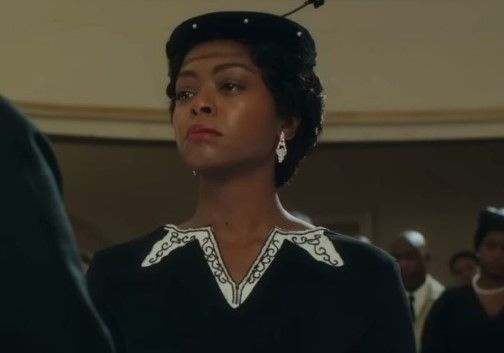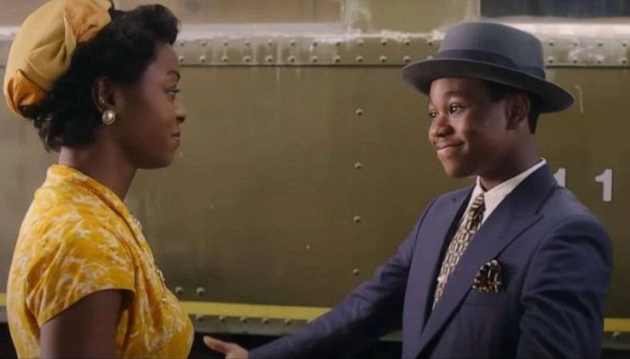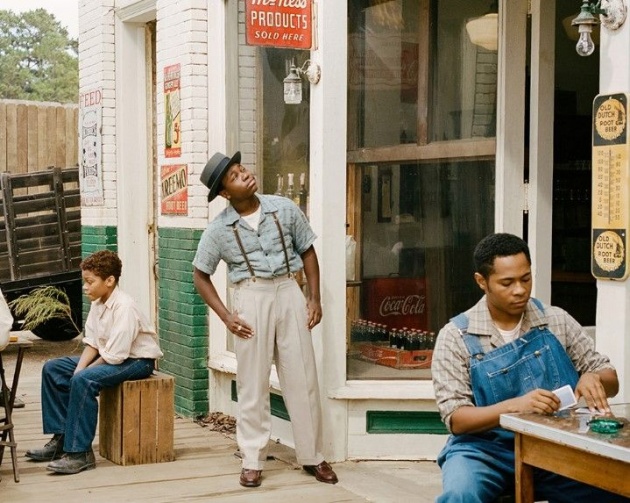
Pictured: Mamie Till-Bradley (Danielle Deadwyler) in a scene from the fact-based American drama, 'Till', directed by Chinonye Chukwu from a screenplay by Keith Beauchamp & Michael Reilly and Chukwu. Still courtesy of MGM/Orion Pictures (US) / Universal Pictures (UK)
Till is a two-hour victim statement marketed as a drama. Centred on the real-life brutal lynching of fourteen-year-old Emmett Till (Jalyn Hall) in Money, Mississippi in August 1955, it focuses on the grief of his mother, Mamie (Danielle Deadwyler), putting her emotions front and centre. The primacy of Mamie’s sorrow and anger displaces every other aspect of the story – the killers, J W Milam (Eric Whitten) and Roy Bryant (Sean Michael Weber) being acquitted in the subsequent trial, though later admitting their guilt, the shopkeeper, Carolyn Bryant (Haley Bennett), whose exaggerated sense of offence led to Emmett being ‘taught a lesson’ and her subsequent perjury, escaping prosecution. A caption tells us that in March 2022, lynching was finally classified as a crime in the United States, 67 years after Emmett’s death, but the film, directed by Chinonye Chukwu (Clemency), who also contributed to the screenplay by Keith Beauchamp & Michael Reilly, anchors the viewer to Mamie. The film is a salient reminder that the wounds of racially motivated violence don’t heal, that they should not be forgotten. Though Mamie does not receive justice, she isn’t crushed.
Another filmmaker might have used Emmett Till’s story to express outrage. Chukwu’s film situates Emmett’s death as part of a long-running struggle for racial equality. We hear that two NAACP activists, Reverend George Lee and Lamar Smith, were killed earlier that year – in Lamar’s case a fortnight before Emmett’s death – for their work in advocating black voter registration. Mamie, a Chicago resident who (by her own description) is the only negro working for the Air Force in her office, allows her son to visit his cousins in the tail end of summer, against her better judgment. No sooner than he leaves by train than she immediately regrets the decision.
Chukwu places the audience claustrophobically close to Mamie from the opening scene, in which she is driving with Emmett to a department store for some final shopping before his trip. The camera appears to be placed in the car dashboard as it looks up at Mamie singing along to the radio, panning to show Emmett next to her, joining in. The camera then rises and frames Mamie dead-on (effectively tilting 45 degrees), an unnatural settling of the image. Chukwu means to make us feel uncomfortable even in idyllic moments.
In the department store, Mamie catches up with Emmett, who has picked out a wallet. She is carrying a box of shoes. A security guard stops her. ‘We have shoes downstairs, ma’am,’ he tells her, indicating that her presence on the shop floor among luxury goods isn’t welcome. ‘Do you tell all your customers that?’ replies Mamie, standing her ground. Although there is some racial tolerance in Chicago, prejudice rumbles underneath like a subway train. Emmett has picked out a wallet that has a black and white photograph of an actress in a see-through pocket. Mamie agrees to purchase it for him. As they pull up to the house, the music from the car is silenced – at certain points, Chukwu moves from extra-diegetic music to diegetic music then quiet, again for unsettling effect. In the house, Emmett sings along to a television commercial, entertaining the adults in the room. ‘You didn’t stutter once,’ says his grandmother, Alma (Whoopi Goldberg), commending him before sending him to bed. She also sends away widow Mamie’s latest gentleman caller, Gene Mobley (Sean Patrick Thomas), who acquiesces. Alma senses Mamie is upset. ‘I’ve never been away from Bobo this long,’ Mamie tells her, Bobo being Emmett’s pre-birth nickname. This becomes a refrain.

Pictured: Farewell, Bobo. Mamie Till-Bradley (Danielle Deadwyler) says goodbye to her son, Emmett (Jalyn Hall) in a scene from the fact-based American drama, 'Till', directed by Chinonye Chukwu. Still courtesy of MGM/Orion Pictures (US) / Universal Pictures (UK)
'
In the morning, Mamie helps Emmett put on a tie and allows him to wear his father’s signet ring, engraved with the initials ‘LT’ and a date in 1943. Mamie would prefer that Emmett wore the cufflinks. Emmett turns being dressed into a little dance, twirling his mother around the room to the sound of Dizzy Gillespie’s ‘He Beeped when he should have Bopped’ – before she sends him away so she can get ready. She embarrasses him on the station platform by asking for a kiss and asks a local preacher, who is also leaving Chicago, to keep an eye on him. Abel Korzeniowski’s score echoes the sound of a train as Emmett stares out of the window before being told ‘it is time to move’ and leaving his seat to walk with other African Americans to a designated ‘black only’ carriage, having travelled into a region where racial segregation is still enforced. The Emmett of the film is cheerful, confident, but naïve, scarcely able to recognise the danger he will find himself in. The score ceases to echo the sound of a train and blends in with the call of cicadas.
Though Emmett joins his cousins at picking cotton, he treats it as an optional pastime rather than a livelihood. ‘What do you pick cotton for?’ he asks as if his family had other options. One of his cousins wants to try on his ring. ‘Maybe later,’ suggests Emmett, who we sense would prefer not to loan it out. He is taken away from the fields and into town, a trip that has fatal consequences.
Complaining about the general quiet of the shop porch, Emmett goes inside. His stride is confident as he takes in the store layout. A young woman – the aforementioned Carolyn Bryant – stands behind the counter. In front of Emmett, a young African American man leaves. We note the cowering arch of the young man’s back in stark contrast to Emmett’s upright posture. Emmett helps himself to a gumball in a manner that bridles Carolyn before looking up at her and remarking that she resembles a movie star. Carolyn’s offence reaches eleven, but he does not read her face, rather shows her the picture in his wallet. He then puts a coin on the counter and leaves. Carolyn follows him. As she stands in the shop doorway, Emmett looks at her and utters a wolf whistle. Humiliated, Carolyn returns to the house. The other gentlemen outside stand up and flee. ‘She’s going to get her gun.’ Emmett gets into his guardian’s car and is driven away. We see Carolyn, armed, standing in the road, receding into the distance.
On no account must any of this be conveyed to his mother, who visits the barber shop where Gene works to suggest that they all take that trip with Bobo they’ve been talking about. ‘Let’s wait a few days,’ suggests Gene, a decision that will have fatal consequences.
Chukwu’s technique is to avoid giving Mamie any point of view shots in the company of white people, so we rarely see what she sees. Chukwu and her veteran cinematographer, Bobby Bukowski often frames characters in doorways and moves the camera from a shot of a disembodied passers-by torso to show Mamie. She employs visual and aural strategies associated with horror films, not just the sudden silences but light shining through beams of wood as J W Milam and Roy Bryant approach Emmett’s cousins’ house to seize him and mete out punishment. Emmett isn’t worried and refuses to flee. He complies with their request to get dressed, putting on his socks. ‘You don’t need to wear socks,’ he is told by a disembodied white voice. Emmett bridles at this. The preacher begs for Emmett’s life and gets a gun pointed at him. Throughout, we see lights shone in black characters’ faces, obscuring the features of their attackers.
Chukwu doesn’t show Emmett being tortured. Her camera is placed at a distance from the building in which he is beaten up. The camera pans across the building then settles. We hear screams, the shot held long enough for us to absorb the horror of the moment.
The next day, a local observes something being carried out of the building where Emmett was brutalised. Mamie awakes to the sound of the phone next to her bed. Cut to her rushing out of the house. Gene catches her – it is unclear why he is visiting early in the morning, but we don’t stop to think about it. He is there to stop her rushing to Mississippi, where she might place herself in danger.
Mamie is then in every subsequent scene except one, from being introduced to NAACP activists, to making frantic phone calls to hearing the news from a neighbour. Mamie’s emotional state gives every scene its tempo. Chukwu never leaves her side and never departs to stress the larger struggle. This is both the film’s strength and its weakness. We are emotionally paralysed by Mamie to the extent that we don’t question her decision to put her son’s body on public display.
Deadwyler’s Mamie is commanding. She is the one telling a reporter to come with her. Her first act is to use her new allies to get Emmett’s body, found abandoned in a river, transferred from Mississippi to Chicago. A set of politicians are involved – we are told ‘it is an election year’ – though I thought US election years where even, not odd. At a service, Emmett greets mourners inside a church. Only gradually does Chukwu pull back to reveal a choir behind her. It is the film’s only crane shot.
Mamie takes advice, having been asked questions about her personal life. ‘Down there I’m viewed as some sort of Jezebel,’ she explains to Gene, who insists on coming with her to Mississippi, ‘I have to protect my image.’ This seems a fairly modern sentiment; I doubt in 1955 they would use the word image in that way. However, Gene accepts the point. Mamie’s estranged father, John (Frankie Faison) accompanies her instead. ‘I don’t just need you when I’m broken,’ Mamie tells him, the only line of dialogue that reaches outside of her immediate emotional situation, the only line that doesn’t refer to her status as a mother.
Mamie’s emotional state so dominates that when she is told by an NAACP activist that she is admired, we don’t feel it. None of Mamie’s acts in the film are borne out of consideration of the bigger picture. She doesn’t politicize her grief in spite of pleas to do so. This is the point of the film: that the mourning of the families of victims of racial violence isn’t exaggerated for political gain. It is real and should be respected for what it is. The drama is constructed through the prism of ‘Black Lives Matter’ but moves from the slogan to a raw emotion. It is over-egged at one point – the only scene I thought was emotionally false – when Mamie embraces the packing case in which son’s body is contained and cries, ‘open it up, he can’t breathe in there,’ a reference to the late George Floyd’s cry when subjected to police violence, ‘I can’t breathe’.
Without the assistance of the NAACP, Mamie could not have been conveyed safely to Mississippi, a state where the odds are stacked against her. She arrives at the courtroom with her support in a trio of black cars. Accosted by reporters to give them a quote, Mamie’s speech is interrupted by toy gunfire. We hear a young white boy laugh. A sign tells us that one town is ‘a great place to raise a boy’, though clearly how they are raised is of concern.
In the court building both Mamie, her father as well as all of her support group are frisked, while white folks walk in without being checked for weapons. ‘How dare you,’ says Mamie. She is then told by a sheriff that ‘there are only eight seats for negroes. The rest of you have to stand at the back.’ This includes the family of Emmett’s cousin, the head of whom, Moses Wright (John Douglas Thompson) testifies.
When Mamie first meets Emmett’s cousins, two boys are feeding chickens. The camera stays at a distance from Mamie. She greets Moses wearing a grey pleated skirt, that looks like an upturned Reese’s Pieces wrapper. ‘Won’t you sit down,’ Moses asks her. Mamie refuses to do so. Her complaint is that Moses had a gun. He could have defended Bobo. ‘You chose your family over mine,’ she cries. ‘I don’t blame myself from Emmett’s death,’ Moses replies. The sentence hangs in the air with the hint of accusation against Mamie herself.

Pictured: Emmett Till (Jalyn Hall) outside Bryant's store in a scene from the fact-based drama, 'Till', directed by Chinonye Chukwu from a script by Keith Beauchamp & Michael Reilly and Chukwu. Still courtesy of MGM/Orion Pictures (US) / Universal Pictures (UK)
Unlike other films about trials, we don’t for one moment think that Mamie’s lawyers will secure a guilty verdict. Chukwu emphasises the effort to secure a conviction against insurmountable odds, in particular, an all-white, all-male jury who wander in. Calling them to take their seats, the judge asks for a Coca Cola, reminding us not just about the advert just above the town that’s ‘a great place to raise a boy’, but that this is more of an entertainment than execution of justice. The judge’s attitude is casual. The verdict is a formality. Moses testifies at cost to themselves and his family. ‘No black man in Money expects to speak out against a white man and lives.’ At the end of his testimony, in which he points the finger at J W Milam, we see Moses’ family, forced to stand at the back, leave. This is their sacrifice - fruitless yet devastating.
In the only post-murder scene not to feature Mamie, one of the witnesses is chased by NAACP activists and coerced into testifying. The young man explains what he heard to a sceptical prosecution. When Mamie takes the stand, Chukwu doesn’t cut away. The camera stays on Deadwyler as she is questioned. She is asked how she recognised her son. ‘A mother knows,’ Mamie explains. We see her close her eyes as she recounters tracing the contours of her son’s body. Her eyelids flutter rapidly reveal a thin slither of the white of her eyes. It is an image that powerfully illustrates Mamie’s distress – and the power of Deadwyler’s performance.
In a similarly powerful scene, Chukwu obscures the view of Emmett’s body, covered by a white sheet, until Mamie pulls back the sheet to look at him. The camera rises and tilts to show Emmett’s brutalised face – skull punctuated, jawbone barely visibly through puffed up skin. The distance of the camera from the body and from Mamie makes the audience experience the horror of Emmett’s brutal treatment all the more.
The concluding courtroom testimony is somewhat odd, in that the jury members are ordered out while Carolyn explains to the judge what happened, acting out a completely fabricated assault that Emmett allegedly committed, adding that Emmett said, ‘it’s okay. I’ve been with white women before.’ In loaded testimony, Carolyn refers to Emmett as a man (not a boy) who had followed Carolyn into the family quarters where children were sleeping. After listening to this painful defamation, Carolyn leaves the courtroom. ‘I know what the verdict will be.’ As the verdict is broadcast on the car radio, we see the all-black town through which Mamie passes, residents appearing to wave goodbye. It is a tonally odd moment. It is as if every person in the town were Mamie, waving goodbye to her son at the railway station, not cognisant of the horror to come. The waving goodbye speaks to the disturbances of the 1960s and the fires of prejudice reignited on a regularly basis to the present day.
Mamie is told that some ‘black people’ helped take Emmett away, a reference not just to J W Milam’s employees but to black Republicans who became Donald Trump supporters. The film speaks to America of the moment, in which justice for African Americans is illusory.
Till is not a film that empowers its audience, rather is a reminder of a system that is broken, no matter what some may say. By keeping the camera on Mamie, Chukwu doesn’t objectify her, rather demonstrates her strength and love. The film ends with Mamie addressing an audience in Brooklyn, reminding us that the death of one black person at the hands of white people is a concern for all black people. It is an advocate for vigilance, so long as prejudice exists.
Reviewed at Cineworld Ashford, Sunday 1 January 2023 (19:30, Unlimited preview screening) and Cineworld Dover, Screen One, Saturday 14 January 2023, 17:00 screening



